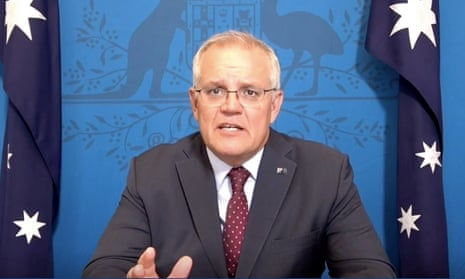Scott Morrison has taken aim at China for “economic coercion”, foreign interference and cyber attacks in a speech to the Davos World Economic Forum.
Without naming the source of “sharper geopolitical competition”, the Australian prime minister warned of increasing territorial disputes in the Indo-Pacific region and urged an end to protectionist measures directed at Australia.
Australia has been the target of Chinese tariffs on key agricultural exports, such as barley and wheat, due to a long series of grievances including “interference in China’s Xinjiang, Hong Kong and Taiwan affairs” and “spearheading the crusade against China in certain multilateral forums”.
Morrison told the forum that the global strategic environment had “deteriorated” with the world becoming more “fragmented and contested particularly here in the Indo-Pacific, which has become the world’s strategic centre of gravity”.
Morrison said the region had become “highly contested” due to increased use of “grey-zone tactics” seeking to “coerce and intimidate”.
“There are tensions over territorial claims, there is rapid military modernisation, there is foreign interference occurring in nations right across the Pacific and here in Australia.
“There’s malicious cyber threats and attacks that are taking place, disinformation, economic coercion.”
In response, Morrison said Australia had sought a “web of alignment” with nations that wanted to cooperate to “favour freedom and the rule of law”, including Pacific nations, Asean and the Quad group with Japan, India and the US.
“Australia’s interests are inextricably linked to an open inclusive and prosperous Indo-Pacific, one where the rights of all nations are protected … as well as aspirations as sovereign nations.”
Morrison argued that Australia had sought to “hold firm to its values” despite experiencing economic protectionist and coercive measures that were “not without costs”.
“But I also believe it’s come at a significant cost to the countries which implement such measures – it’s hard to see how anyone wins from such tactics.
“The world can’t afford to march in that direction.”
Morrison also noted increased tension with Russia over Ukraine and between the G2 of US and China. “The idea that we would be in a hemisphere of influence with one power in the region, is not something that is consistent with global stability and regional stability.”
Australia has sought to fight off Chinese tariffs at the World Trade Organization, while some National party members in the ruling Coalition suggesting countering with protectionist measures. The US has vowed to help Australia resist Chinese protectionism.
Morrison also used the Davos speech to boast of Australia’s economic recovery from the pandemic, with unemployment down to 4.2%, and its health outcomes, with the second-lowest death rate in the OECD from Covid and eighth-highest vaccination rate.
Morrison said there had been no “great resignation” in Australia, crediting its success to a “business-led recovery” and not pursuing “funky experiments” with a permanently enlarged role for government in the economy.
On climate, Morrison said Australia had cut its emissions by 20% on 2005 levels and now aims to achieve net zero by 2050.
But when asked if Australia would sign up to the ICAO protocol for net zero emissions in the aviation sector, Morrison dead-batted by saying Australia “doesn’t make commitments without fully considering what the impacts are”.
